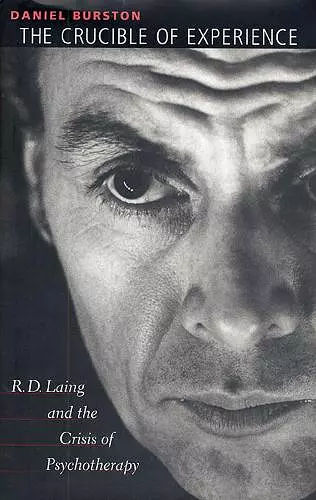The Crucible of Experience
R. D. Laing and the Crisis of Psychotherapy
Format:Hardback
Publisher:Harvard University Press
Currently unavailable, and unfortunately no date known when it will be back

Daniel Burston is one of the most thoughtful and perceptive scholars writing today about the history of psychoanalysis. He uses his broad, multi-disciplinary knowledge to provide keen insights into the discipline and its major figures, thus making this book a valuable contribution to the contemporary intellectual and cultural history of the behavioral sciences. -- Deirdre Bair, author of Anais Nin: A Biography Daniel Burston is a formidably equipped, scrupulous scholar, and one of the best contemporary writers on psychology. This book, like his admirable biography of R. D. Laing, is learned and stimulating as a work of scholarship, and will interest both philosophers and psychiatrists. More broadly, its arguments offer a welcome--and controversial--challenge to the currently dominant biological, antipsychological psychiatry. -- Dr. Anthony Storr At last a book on R. D. Laing that concerns itself principally with his contributions to psychotherapeutic theory and practice. Daniel Burston's elegant analysis of Laing's interpretations of, and allegiance to, existential phenomenology is both balanced and provocative. As a reminder of why Laing continues to matter to contemporary psychotherapy, this text is indispensable. -- Ernesto Spinelli, School of Psychotherapy and Counseling, Regent's College (London) Daniel Burston subjects R. D. Laing's theories and treatments of madness to an evaluation that is scholarly, dispassionate and scrupulously attentive to the facts while at the same time providing a thought-provoking and subtle account of one of the most complicated and talented of European psychiatrists. Laing's role as philosopher as well as psychotherapist is more thoroughly explored and assessed in this book than in the many books and essays that have already appeared devoted to the whole Laingian experience. It is an invaluable work for anyone eager to understand one of the most influential figures of the twentieth century. -- Anthony W. Clare, author of In the Psychiatrist's Chair, and On Men: Masculinity in Crisis
One of the great rebels of psychiatry, R. D. Laing challenged prevailing models of madness and the nature and limits of psychiatric authority. Here, Laing’s widely praised biographer distills the essence of Laing’s vision, which was religious and philosophical as well as psychological.
One of the great rebels of psychiatry, R. D. Laing challenged prevailing models of madness and the nature and limits of psychiatric authority. In this brief and lucid book, Laing’s widely praised biographer distills the essence of Laing’s vision, which was religious and philosophical as well as psychological.
The Crucible of Experience reveals Laing’s philosophical debts to existentialism and phenomenology in his theories of madness and sanity, family theory and family therapy. Daniel Burston offers the first detailed account of Laing’s practice as a therapist and of his relationships—often contentious—with his friends and sometime disciples. Burston carefully differentiates between Laing and “Laingians,” who were often clearer, more confident, and more simplistic than their teacher.
While he examines Laing’s theories of madness, Burston focuses most provocatively on Laing’s views of sanity and normality and on his recognition, toward the end of his life, of the essential place of holiness in human experience. In a powerful last chapter, Burston shows that Laing foresaw the present commercialization of medicine and asked pointed questions about what the meaning of sanity and the future of psychotherapy in such a world could be. In this, as in other matters, Laing’s questions of a generation ago remain questions for our time.
At last a book on R. D. Laing that concerns itself principally with his contributions to psychotherapeutic theory and practice. Daniel Burston’s elegant analysis of Laing’s interpretations of, and allegiance to, existential phenomenology is both balanced and provocative. As a reminder of why Laing continues to matter to contemporary psychotherapy, this text is indispensable. -- Ernesto Spinelli, School of Psychotherapy and Counseling, Regent’s College, London
Daniel Burston is a formidably equipped, scrupulous scholar, and one of the best contemporary writers on psychology. This book, like his admirable biography of R. D. Laing [The Wing of Madness], is learned and stimulating as a work of scholarship, and will interest both philosophers and psychiatrists. More broadly, its arguments offer a welcome—and controversial—challenge to the currently dominant biological, antipsychological psychiatry. -- Anthony Storr, author of Feet of Clay: A Study of Gurus
Daniel Burston is one of the most thoughtful and perceptive scholars writing today about the history of psychoanalysis. He uses his broad, multi-disciplinary knowledge to provide keen insights into the discipline and its major figures, thus making this book a valuable contribution to the contemporary intellectual and cultural history of the behavioral sciences. -- Deirdre Bair, author of Anais Nin: A Biography
Daniel Burston subjects R. D. Laing’s theories and treatments of madness to an evaluation that is scholarly, dispassionate and scrupulously attentive to the facts while at the same time providing a thought-provoking and subtle account of one of the most complicated and talented of European psychiatrists. Laing’s role as philosopher as well as psychotherapist is more thoroughly explored and assessed in this book than in the many books and essays that have already appeared devoted to the whole Laingian experience. It is an invaluable work for anyone eager to understand one of the most influential figures of the twentieth century. -- Anthony W. Clare, author of In the Psychiatrist’s Chair
ISBN: 9780674002173
Dimensions: 235mm x 149mm x 20mm
Weight: 390g
192 pages